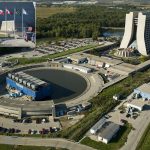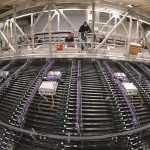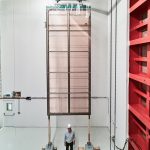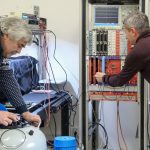FERMILAB-CZ – website
– website
Hosting institution: Institute of Physics, CAS
Partner institutions:
Fermilab-CZ supports and coordinates collaboration of the Czech research organisations in Fermilab (Fermi National Accelerator Laboratory), United States premier national laboratory for particle physics, operated by Fermi Research Alliance LLC for United States Department of Energy. More than 4 200 scientists worldwide use Fermilab for their research. Fermilab-CZ supports the Czech contribution to the detector design and construction, running and maintenance of the experiments and their upgrade. The Czech researchers also participate in Fermilab management bodies. Expertise of the Fermilab-CZ covers various areas such as detector design (e.g. silicon photodetectors), detector infrastructure monitoring, running and data acquisition and processing using novel statistical and artificial intelligence methods. It is reflected by provided services – detectors design and construction, their running, monitoring and maintenance, delivery of computing capacities for data processing from the Czech Republic and support of novel statistical and artificial intelligence methods for data analysis. Electromechanical workshops of the Fermilab-CZ in the Czech Republic perform long term detector tests and contribute to their upgrade. For the last 25 years, Fermilab operated proton–antiproton particle collider TEVATRON at highest achieved energy and produced numerous unique results in research of fundamental mass properties. The operation of TEVATRON was finished in 2011. Nowadays, Fermilab concentrates on the “Intensity Frontier” programme with neutrino experiments. The Czech researchers collaborate on its flagship neutrino experiment NOvA and on the design and construction of the new international neutrino experiment DUNE.
Future development
The neutrino NOvA experiment should run at least for another 6 years. Fermilab is preparing the base for international long-baseline neutrino experiment DUNE, which aims to discover whether neutrinos and antineutrinos interact with matter differently. This experiment would send a neutrino beam from Fermilab to a large neutrino detector located in a mine in South Dakota. The experiment of such an extent requires worldwide contributions including CERN test beam facilities.
Socio-economic impact
The use of particle accelerators to treat cancer and other contributions to the development of medical imaging techniques such as PET scans (Positron Emission Tomography) and MRI (Magnetic Resonance Imaging) represent examples of particle physics applications. Particle accelerators shrink tumours, improve tires, spot suspicious cargo, clean up dirty drinking water, help design drugs or discover building blocks of matter. In this matter, Fermilab-CZ guarantees access to a broad area of expertise to many physicists, students and technicians and allows them to contribute to newly developed technologies.



